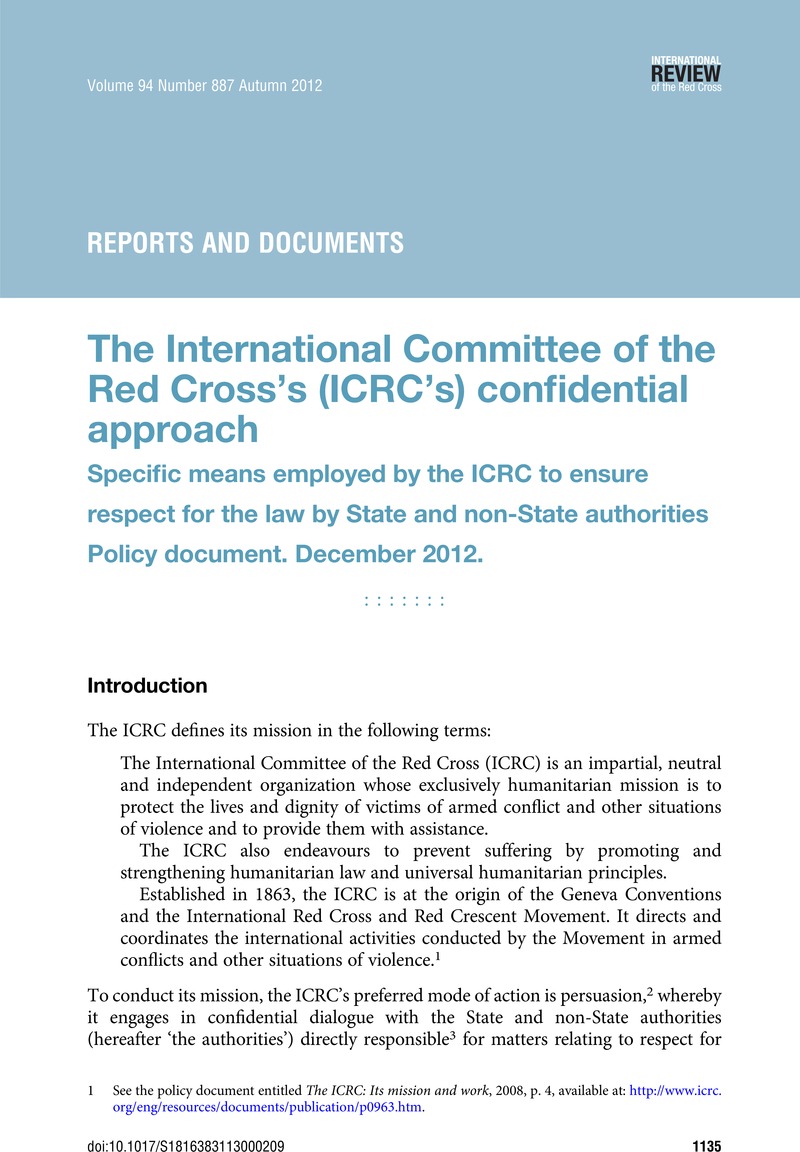Article contents
The International Committee of the Red Cross's (ICRC's) confidential approach
Specific means employed by the ICRC to ensure respect for the law by State and non-State authoritiesPolicy document. December 2012
Published online by Cambridge University Press: 10 July 2013
Abstract

- Type
- Reports and Documents
- Information
- International Review of the Red Cross , Volume 94 , Issue 887: Business, violence and conflict , September 2012 , pp. 1135 - 1144
- Copyright
- Copyright © International Committee of the Red Cross 2013
References
1 See the policy document entitled The ICRC: Its mission and work, 2008, p. 4, available at: http://www.icrc.org/eng/resources/documents/publication/p0963.htm.
2 Ibid., p. 11: ‘Persuasion aims to convince someone to do something which falls within his area of responsibility or competence, through bilateral confidential dialogue. This is traditionally the ICRC's preferred mode of action’. The ICRC's modes of action are raising awareness of responsibility (persuasion, mobilization, denunciation), support, and substitution (direct provision of services).
3 The ICRC protection policy defines what is meant by ‘authorities and other actors’: ‘all authorities and bearers of arms (…) who are able to launch hostile action against persons or a population and who are responsible for protecting those who fall under their control’; available in International Review of the Red Cross (hereafter IRRC), Vol. 90, No. 871, 2008, pp. 751–775, http://www.icrc.org/eng/resources/documents/article/review/review-871-p751.htm.
4 For the reader's sake, the term ‘authorities’ is used here to designate both State and non-State authorities.
5 The roots of behaviour in war: understanding and preventing IHL violations, ICRC, Geneva, October 2004, available at: http://www.icrc.org/eng/resources/documents/publication/p0853.htm.
6 ‘Action by the International Committee of the Red Cross in the event of violations of international humanitarian law or of other fundamental rules protecting persons in situations of violence’ (hereafter Policy on ICRC action in the event of violations), in IRRC, Vol. 87, No. 858, 2005, available at: http://www.cicr.org/eng/resources/documents/article/review/review-858-p393.htm.
7 In this regard, see Max Weber, Politics as a vocation (available at: http://anthropos-lab.net/wp/wp-content/uploads/2011/12/Weber-Politics-as-a-Vocation.pdf), for a discussion of the ‘ethic of responsibility’ (verantwortungsethisch) versus the ‘ethic of ultimate ends’ (gesinnungsethisch). The ‘ethic of responsibility’ presupposes that an organization must be held to account for the foreseeable consequences of its actions. The ‘ethic of ultimate ends’ posits, on the contrary, that the affirmation of a fundamental moral principle, even if the consequences are unfortunate, outweighs all other considerations.
8 See also section 4.1.1 below.
9 Such as suspending or stopping activities.
10 For a definition of the principle of neutrality, see The Fundamental Principles of the Red Cross: commentary, Jean Pictet, 1979, available at: http://www.cicr.org/eng/resources/documents/misc/fundamental-principles-commentary-010179.htm.
11 ICTY, Prosecutor v. Blagoje Simic, Milan Simic, Miroslav Tadic, Stevan Todorovic and Simo Saric, IT 95-9-PT, Trial Chamber III, Decision, 27 July 1999.
12 Specifically, the International Criminal Tribunal for Rwanda and, indirectly, the Special Tribunal for Sierra Leone. Rule 73 of the Rules of Procedure and Evidence of the International Criminal Court expressly recognizes that the information held by the ICRC is not subject to disclosure. The Rules of Procedure and Evidence of the Special Tribunal for Lebanon and those of the Mechanism for International Criminal Tribunals both contain a similar provision.
13 ‘Third parties’ refers to any entity that is not already targeted by the confidential approach (other States, interest groups, civil society players, local and international media).
14 See point 4.1.1 below.
15 See point 4.1.2.a below.
16 See note 6 above.
17 In exceptional cases, the ICRC can be prompted to denounce major violations even if there is no hope of a tangible outcome.
18 The ICRC is regularly confronted with violations of lesser severity that do not fall within the scope of the Policy on ICRC action in the event of violations. They are the subject of bilateral confidential representations until such time as they attain the degree of severity described in the Policy.
19 At present, after 40 years for general files and after 60 years for files containing personal information. See Article 7 of the Rules governing access to the archives of the International Committee of the Red Cross, in Pitteloud, Jean-François, ‘The International Committee of the Red Cross reduces the protective embargo on access to its archives’, IRRC, Vol. 86, No. 856, 2004, p. 961Google Scholar, available at: http://www.icrc.org/eng/assets/files/other/irrc_856_pitteloup_eng.pdf.
20 See point 2.3 above.
21 The pledge of discretion signed by all ICRC staff stipulates that they must ‘maintain the utmost discretion (…) with regard to matters that (they) are called upon to deal with or that come to (their) knowledge in the course of (their) activity at the ICRC, and consider (themselves) bound by an obligation analogous to that of professional secrecy’. Any information they obtain in the performance of their duties belongs to the ICRC. Persons under contract to the organization are therefore not free to use such information as they see fit. The ICTY decision in the Simic case (see above, note 11) implicitly recognizes that the information belongs to the ICRC and not to the individual working for it.
- 3
- Cited by


